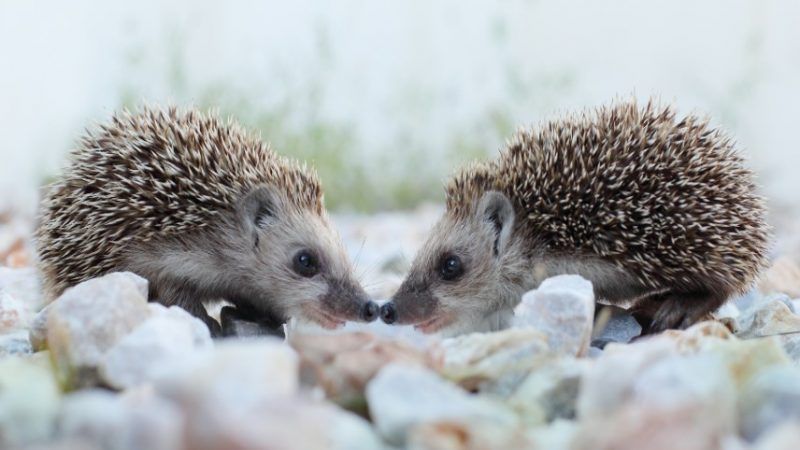Virginia's Fairfax County Has Finally Decriminalized Keeping Hedgehogs as Pets
It's now legal to own one of the spiky creatures.


Spectators at a Fairfax County Board of Supervisors meeting last week were on pins and needles as a long-running and emotional debate finally came to an end: Local lawmakers in the Virginia jurisdiction voted to strike down a ban on keeping hedgehogs as pets. The Board also lightened restrictions on hermit crabs and chinchillas, which previously required permits.
Why the reticence toward hedgehogs, those harmless mammals that spend the vast majority of their days curled tightly in the fetal position? It's not because their quills are too dangerous for public exposure. Rather, it's because they are "exotic animals"—ones that welfare advocates say are misunderstood.
"That is the perfect recipe for people to think it would be fun to own one," said Christina Anderson, a member of the Fairfax County Animal Services Advisory Commission, who testified in favor of the hedgehog ban. "Nothing could be further from the truth."
Chris Schindler, vice president of field services for the Humane Rescue Alliance, echoed Anderson's sentiments, arguing that the bristled beasts are no walk in the park. "People get them and then realize there's more to caring for them," he said. They are built to forage and are nocturnal, added Schindler, the latter of which could keep some unassuming owners awake at night.
But hedgehog devotees say those concerns are misplaced. "Hedgehogs can be cared (for) through widely available products, through education and through an effort to remind people that when they take on an effort to care for an animal, whatever that animal is, they have a responsibility," said Mike Bober, President of the Pet Industry Joint Advisory Council.
My sister Molly, who used to own one of these spiny critters, agrees.
"They only need to go to the vet once per year (assuming they're in good health), eat once per day, bathe once per month, and have their habitats cleaned once per week," she tells Reason. "They love to explore, play with small toys, and they're easy to dress up, if you're into that kind of thing."
Several other locales have hedgehog bans on the books, including California, Pennsylvania, Hawaii, and New York City. Those laws make up just a fraction of the restrictions placed on domesticated animals across the country. Owning a Quaker parrot is illegal in quite a few states, and pet ferrets are prohibited in California, Hawaii, and D.C., with a slew of other states requiring permits. Many species of bat are federally protected, which means those cave dwellers are a no-go if you're looking for your next winged companion. (Good luck if one gets into your home; if it happens to be on the Endangered Species List, as some bats are, you need to get it out alive.)
While Fairfax County just became a haven for hedgehogs, they are still outlawed in neighboring Washington, D.C. The nation's capital was poised to lift the restriction last year, but backed down after the Humane Rescue Alliance pressed them to reconsider. Spineless.
Editor's Note: As of February 29, 2024, commenting privileges on reason.com posts are limited to Reason Plus subscribers. Past commenters are grandfathered in for a temporary period. Subscribe here to preserve your ability to comment. Your Reason Plus subscription also gives you an ad-free version of reason.com, along with full access to the digital edition and archives of Reason magazine. We request that comments be civil and on-topic. We do not moderate or assume any responsibility for comments, which are owned by the readers who post them. Comments do not represent the views of reason.com or Reason Foundation. We reserve the right to delete any comment and ban commenters for any reason at any time. Comments may only be edited within 5 minutes of posting. Report abuses.
Please to post comments


The Board also lightened restrictions on hermit crabs and chinchillas, which previously required permits.
I guess Crusty will need to find a new way to thumb his nose at the law.
Big Hog wins again.
Technically, it was the chinchilla that was supposed to get a permit to house Crusty.
Spectators at a Fairfax County Board of Supervisors meeting last week were on pins and needles...
I bristle at this pun.
Just brush it off.
Go hedgehogs!
And so tasty too!
What is the backstory on the affirmative decision to ban hedgehogs in the first place?
Are they an invasive species that destroys gardens when disappointed owners release them into the wild?
Do they ban chicks and ducklings at Easter?
Legislators at all levels from municipal to the US Congress aren't happy unless they are banning something. They each wrote a ban candidate on a piece of paper threw them all in a hat and hedgehogs was the item that got picked that day.
Reasons for the ban are always invented post-hoc.
Hihn the Temperate will be happy to know that Hedgehogs are now legal in VA.
(Good luck if one gets into your home; if it happens to be on the Endangered Species List, as some bats are, you need to get it out alive quietly dispose of it, and any witnesses.)
Always remember the three S's: shoot, shovel, shut up.
I'd guess that children are even harder to care for than hedgehogs. Can we ban them as well?
New York and Virginia are trying their best.
I can see why Hawaii might ban hedgehogs and ferrets. The ferrets especially seem like they could be pretty damaging to the ecosystem there if a feral population were to develop
It's a little late for Hawaii. The fucking mongooses (or is it mongeese?) are everywhere, raiding dumpsters and such.
There is no end of those who want nothing more out of life than to get in a position to tell you what to do. No, fucking, end.
Owning a hedgehog or any other animal is nothing more than animal appropriation and slavery.
The fascist owners like to brag about their "hedgehog collection," and yet never ask what the animal thinks about being locked up without due process, a lawyer or even a trial.
This "keeping of pets" is a crime against humanity and is not only unfair to the animals but a gross violation of their civil rights under the US Constitution.
If that isn't bad enough, these critters are forced to turn a wheel around for hours at a time without due compensation, and that is slavery folks.
When all these hedgehogs are released from the iron bars that keep them incarcerated against their will, paid for their work, and be compensated for this gross miscarriage of justice, then, and only then, will America be a free country.
can not tell if serious please elucidate
Please look up the word, "sarcasm," and you'll understand my writings better.
Okay, but now you have to look up "Poe's Law".
You can't do a great job of parodying people and then turn around and blame people for not realizing it was a parody. That's what happens when you do a great job of parody, and you should know that.
Dinsdale! Dinsdale!!!
Being able to own a hedgehog is sort of like being able to play the banjo.
Just because you can doesn't mean you should.
"Dress them up"? Good grief. This is what gives pet owners a bad name. They are animals, not little people with four legs. And it is this mindset that the animals are here for our entertainment and amusement that makes for bad pet ownership. They are not here for us, we are here for them and that's an essential bit of education that is missing from any discussion of allowing people to own exotic (or any) animals.
That is a very good decision i feel, these animals could be dangerous but i do no think they would harm anyone intentionally.
See: https://gpacalculator.wiki